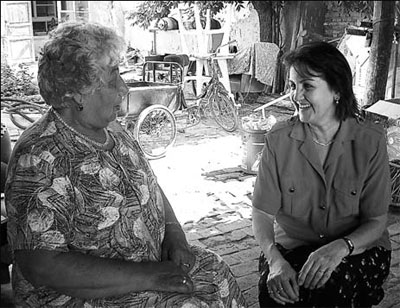In 2006, Lisa spent the Spring Festival with Gemar Yumco's family in northwestern Yunnan. In three days, she took two planes, one bus, one truck and one horse before she reached the village. As Gemar Yumco's father put a white hada on her shoulders, she was moved to tears. "This was real life, not a TV show," she says.

Carducci talks with Russian woman Jina during her trip to the Xinjiang Uygur autonomous region. Photos courtesy of Lisa Carducci
The girl's sister and cousin greeted her the traditional way with yoghurt and buttered tea, not knowing if she could drink liquor. The neighbors brought many eggs to welcome her. "They were the most good-hearted people that I had ever met in my life," she says.
In the family's dim, smoky house, Carducci held the hands of Gemar Yumco's mother and admired her two rings. Upon departure, the 60-year-old woman insisted that she chose one as a souvenir.
"I really feel I belong to the family," says she, stroking the red stone on her right middle finger.
To learn more about the situation in Tibet, Carducci took a day off last week to find out what the Western press is saying. She says that two German papers "have acknowledged that they had fabricated news about Tibet".
Carducci has always been forthright in her opinion. When the Chinese embassy in Belgrade was bombed in 1999, she wrote an article saying that the United States was responsible.
When China Daily published it on the editorial page, two journalists, one American and one German, called her to ask who paid her to write it and if she was really a foreigner.
"When I defend China, it's because I think China is right. And I believe that those who accuse China do it because they don't know.
"Give me $1 million, I will tear it up, I will burn the money. But I will never say something I don't think personally.
"I may make mistakes, but my mistakes are sincere," says Carducci, who has donated blood 108 times, including 22 times in China.
The latest piece in Carducci's studio was painted in 2005, a large board that she would add different elements to each month. That was an eventful year: She got the Chinese "green card"; Voyage - poems of her journeys, won the Dijon City Publication Award in France, and The Twin Yokes Egg - a collection of short stories, was awarded the 2006 Publication Prize of Editinter; she visited her Tibetan daughter's family in Yunnan; she underwent a surgery, and so on.
With the "green card", she can stay in China without a work contract or a visa.
"This is my country. I'm at home here. If I had to leave the country, for me it would be, [sigh] the end of the world. I would die."
(China Daily April 9, 2008)